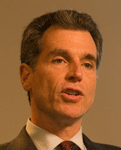Book Discussion: The Upside of Down: Catastrophe, Creativity, and the Renewal of Civilization
According to Thomas Homer-Dixon, society is more likely to break down when multiple stresses occur simultaneously. Like an earthquake, societal pressures—or "tectonic stresses"—build up beneath the surface and are released by factors that are difficult to anticipate, sometimes with catastrophic results.
Overview

 The San Francisco earthquake and subsequent fire of 1906 left the city in physical, social, and economic ruin. But the city was rebuilt smarter and stronger than before. According to Thomas Homer-Dixon of the University of Toronto, this story reveals the "moments of contingency" that exist within collapse. While fleeting, these moments offer the opportunity to reform institutions, social relationships, and entrenched habits and behaviors. But society must be prepared and resilient in order to rebuild, said Homer-Dixon, presenting his new book, The Upside of Down, at an event sponsored by the Environmental Change and Security Program on November 3, 2006.
The San Francisco earthquake and subsequent fire of 1906 left the city in physical, social, and economic ruin. But the city was rebuilt smarter and stronger than before. According to Thomas Homer-Dixon of the University of Toronto, this story reveals the "moments of contingency" that exist within collapse. While fleeting, these moments offer the opportunity to reform institutions, social relationships, and entrenched habits and behaviors. But society must be prepared and resilient in order to rebuild, said Homer-Dixon, presenting his new book, The Upside of Down, at an event sponsored by the Environmental Change and Security Program on November 3, 2006.
According to Homer-Dixon, society is more likely to break down when multiple stresses occur simultaneously. Like an earthquake, societal pressures—or "tectonic stresses"—build up beneath the surface and are released by factors that are difficult to anticipate, sometimes with catastrophic results. Currently, the world is facing converging simultaneous stresses, and finding solutions first requires realizing the problems: "We need to have a better understanding of the challenges we face before we can really start to talk in creative ways about what we should do," he said. Homer-Dixon believes five tectonic stresses—demographics, economics, environmental degradation, climate change, and energy scarcity—threaten today's global order. These stresses are magnified by the rising connectivity of societies, and by the growing ability of small groups to cause widespread disturbance.
Tectonic Stress
Global population growth does not concern Homer-Dixon. Instead, he worries about differential population growth—a region experiencing static or declining population adjacent to a region experiencing rapid population growth. This imbalance creates enormous stress along the boundary, dramatically increasing the risks of conflict and political radicalization. Another tectonic stress, economic imbalance, can similarly increase the risk of conflict along boundaries: "The poor can see how the rich are living," he pointed out. "And people are motivated and made angry by gaps between incomes."
The third stress, environmental degradation, disproportionately affects people living at the subsistence level, he said: "In many places, this degradation of environmental resources has weakened those societies, and hollowed them out from the inside." As a result, migration to the cities has increased, putting greater pressure on limited urban resources. The fourth stress, climate change, will exacerbate the impact of environmental degradation. From melting permafrost to the worsening mountain pine beetle infestation in Canada's forests, the effects of climatic changes are becoming more apparent and severe: "The realization of these trends leads some people to believe that we are much closer to a point of irreversibility of climate change than was realized previously."
Energy scarcity, the final tectonic stress, is swiftly becoming a reality, argued Homer-Dixon. "We are consuming somewhere between three and five times more oil on an annual basis than we are discovering." A believer in peak oil theory, he noted that production in more than 50 countries—including the United States—appears to have passed its peak, and is now starting the terminal decline predicted by the theory. At the current rate, global energy consumption is unsustainable: "We are not investing nearly the resources we need in energy innovation…We need to rethink everything from the design of our cities to the fundamental nature of our economies."
Two additional factors could multiply the impact of Homer-Dixon's five tectonic stresses. Communication technology has allowed people around the world to connect with each other at the touch of a button. But connectivity, he argued, is not inherently positive. Second, power is devolving from governments to small groups and individuals. This power shift, in part enabled by the speed and ease of communication, is particularly threatening to national security. For example, a crude atomic device requires roughly 100 kilograms of highly enriched uranium. Around the world, roughly 1,000 tons of highly enriched uranium are housed in relatively insecure storage areas. "This means we need a control regime that is 99.99 percent effective. And I don't know of anything that human beings design that is 99.99 percent effective or leak-proof indefinitely."
Eluding Yeats' "Second Coming"
"We need to start thinking more creatively about what we are going to do in the volatile future, in which breakdown in some form is increasingly likely," said Homer-Dixon. The first step requires discarding the dichotomous picture of the future in which total nirvana and utter collapse are the only likely outcomes. Something between the two poles is more likely: "The places in the middle might turn out to be really interesting, and it is those places that offer us the motive and opportunity to produce really creative change in our systems."
Planning for the future requires building resilience into all systems—technological, economic, political, and social. Increasing inventories is one way to build resilience; today's just-in-time economy is good for efficiency and productivity, but cannot sustain shocks: "It has made our economies very brittle," he observed. For example, many Canadian companies were forced to close temporarily after the events of September 11th shut the border. The companies relied on stocks from the United States, and without inventories, operations ceased until the border reopened.
Societies need to think creatively and holistically about solving problems that transcend borders. The solutions, claimed Homer-Dixon, are infrastructure equivalents to open-source technology: "We need large-scale, voluntaristic, collaborative, non-egocentric problem solving. We need to develop plans so that we have some ideas on the shelf." Unless societies learn to plan for shocks and adapt to them, extremists will have the upper hand, he said: "They will be quick to define enemies, to stoke hatreds, and to instigate violence."
Beyond planning, citizens must work together to battle extremism: "Extremists won't have a collective action problem. They'll be organized, they'll know each other, they'll have resources, their networks will be in place, and they'll probably have a pretty good idea of what they want to do." In "The Second Coming," W.B. Yeats writes that when things fall apart, "The best lack all conviction, while the worst / Are full of passionate intensity." Homer-Dixon finds great insight in this passage: "It is up to the rest of us to not ‘lack all conviction.' We do this by starting to think about what might happen in the future and what we are going to do about it."
Moments of Contingency
Following breakdown, "moments of contingency" emerge. History provides several examples of such moments that have pushed society in both positive and negative directions. Following the Great Depression, President Franklin D. Roosevelt reformed American capitalism and successfully laid the foundation for a century of economic growth and prosperity. Europe experienced a similar economic crisis, but the moment of contingency was harnessed in a very different manner, noted Homer-Dixon: "It allowed Hitler and the Nazis to create one of history's most horrific regimes." ECSP Director Geoff Dabelko asked whether the window for reform following September 11, 2001, was still open. "It is closed," replied Homer-Dixon. "It was a marvelous opportunity to come to grips with foreign dependency on oil. Opportunity squandered. Let's not squander the next one."
Drafted by Alison Williams.
Speaker
Thomas Homer-Dixon
Hosted By

Environmental Change and Security Program
The Environmental Change and Security Program (ECSP) explores the connections between environmental change, health, and population dynamics and their links to conflict, human insecurity, and foreign policy. Read more
Thank you for your interest in this event. Please send any feedback or questions to our Events staff.









